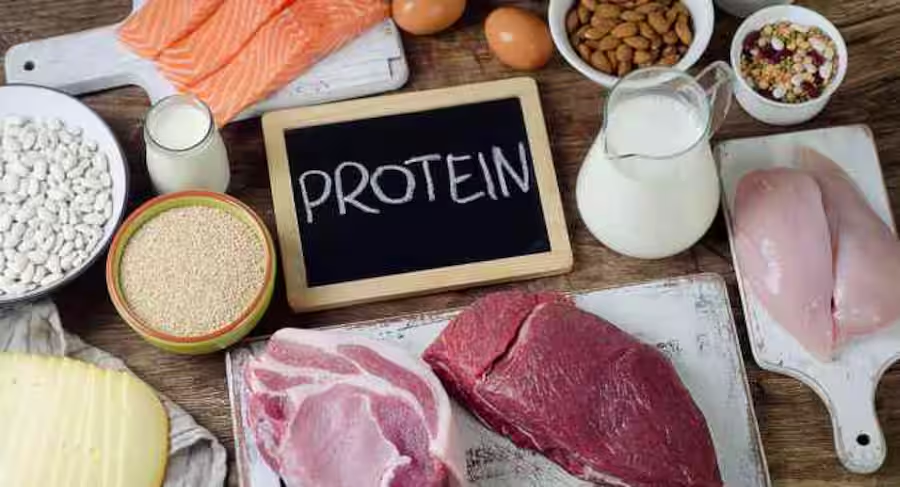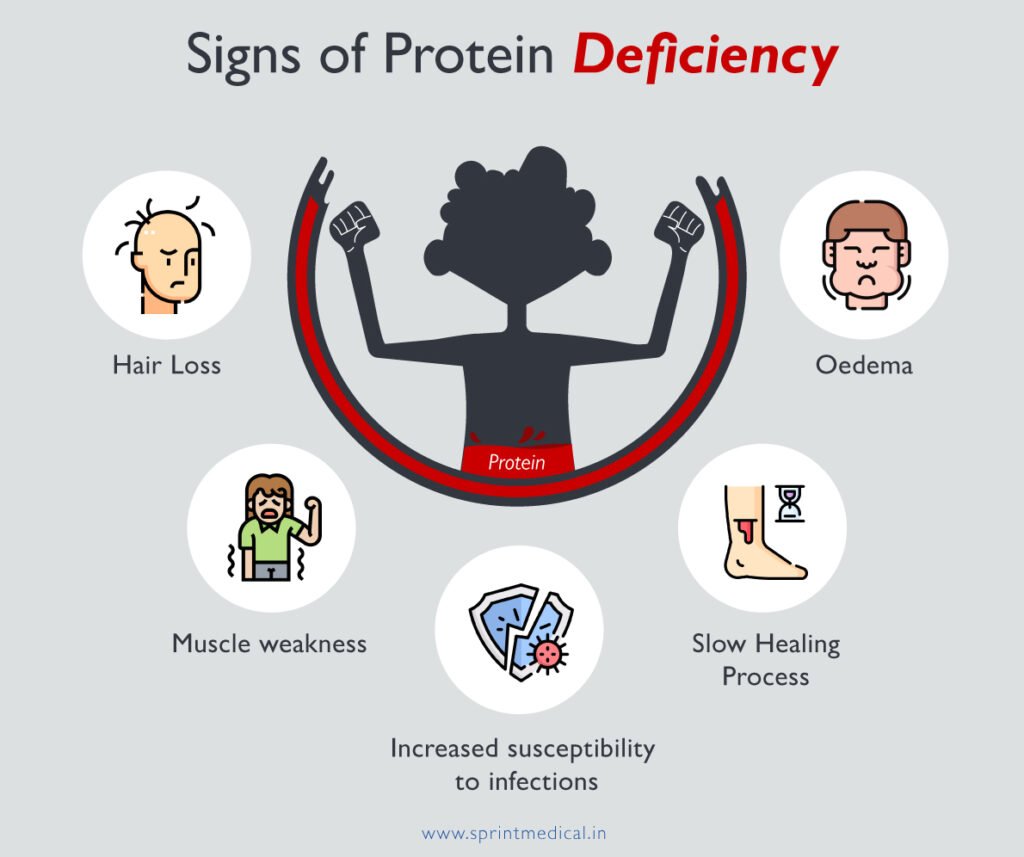
What Is Protein ?
Protein is a vital macronutrient made up of amino acids, often called the “building blocks of life.” It plays a crucial role in repairing tissues, producing enzymes and hormones, and supporting immune function. Found in foods like meat, fish, dairy, beans, and nuts, protein is essential for muscle health, energy, and overall well-being.
Key Functions Of Protein :
1. Builds and Repairs Tissues :
Essential for muscle growth, tissue repair, and healing wounds.
2. Enzyme Production:
Proteins act as enzymes to facilitate biochemical reactions in the body.
3. Hormone Regulation:
Many hormones, like insulin, are proteins that regulate bodily functions.
4.Immune Support:
Antibodies, crucial for fighting infections, are made of protein.
5. Transports Molecules:
Proteins like hemoglobin transport oxygen throughout the body.
6. Provides Structural Support:
Collagen and keratin strengthen skin, hair, nails, and connective tissues.
7. Maintains Fluid Balance:
Helps regulate fluid distribution in cells, preventing swelling.
8. Energy Source:
When carbs and fats are low, protein provides energy for the body.

How To Know If Your Body Needs More Protein ?
Your body may be signaling a need for more protein if you experience :
1. Muscle Weakness or Loss : Difficulty building or maintaining muscle.
2. Constant Fatigue : Low energy levels, even with adequate sleep.
3. Frequent Hunger : Cravings or feeling unsatisfied after meals.
4. Hair, Skin and Nail issues : Brittle nails,thinning hair or dry skin.
5. Slow Recovery : Prolonged healing from injuries or workouts.
6. Frequent Illness : Weak immunity leading to repeated infections.

How Much Protein Do You Need?
Your protein needs depend on factors like age, weight, activity level and health goals:
1. General Recommendation : 0.8 grams per kilogram of body weight (about 0.36 grams per pound).
2. Active Individuals or Athletes : 1.2 – 2.0 grams per kilogram of body weight.
3. Older Adults : 1.0 – 1.2 grams per kilograms to maintain muscle mass.
Example:
A 70kg (154lbs) person needs about 56 grams of protein daily for basic health. Ensuring adequate protein intake helps maintain energy, supports muscle growth, and boost overall well-being!
The Hidden Dangers of Protein Deficiency: How to Spot It and Stay Healthy

What is Protein Deficiency?
Protein deficiency occurs when your body does not get enough protein to meet its needs for growth, repair, and maintenance. This can result from an inadequate diet, certain health conditions, or increased protein needs that aren’t being met.
Causes of Protein Deficiency:
- Poor Diet: Not consuming enough protein-rich foods such as meat, fish, eggs, dairy, legumes, and nuts.
- Medical Conditions: Digestive disorders like celiac disease or Crohn’s that impair protein absorption.
- Increased Needs: Pregnancy, intense exercise, or illness can increase the body’s protein requirements.
- Malnutrition: Common in developing countries or among those with restrictive eating habits or eating disorders.
Signs and Symptoms:
Muscle Weakness & Loss:
Protein is essential for muscle repair and growth. A lack of it can result in muscle wasting, weakness, and difficulty recovering from physical activity.Fatigue & Low Energy:
Protein helps regulate energy levels. If you’re constantly tired or lacking energy, it might be due to inadequate protein intake.Hair, Skin, and Nail Problems:
Protein is vital for healthy skin, hair, and nails. Brittle nails, thinning hair, or dry skin can be signs that you’re not getting enough.Swelling (Edema):
Low protein levels can disrupt the balance of fluids in the body, causing swelling in the feet, ankles, or hands.Weakened Immunity:
Protein helps build antibodies that fight infections. A deficiency may make you more prone to illness and slow down recovery times.Slow Wound Healing:
Protein is crucial for tissue repair. If cuts, bruises, or injuries take longer to heal, it could be a sign of protein deficiency.
Risk Factors:
- Vegetarians/Vegans: Those who don’t consume animal products must ensure they’re eating a variety of plant-based proteins to meet their needs.
- Elderly: Older adults may struggle to maintain muscle mass and require more protein to prevent frailty.
- Athletes: Intense physical activity increases protein needs, especially if recovery is slow or muscles feel weak.
- People with Medical Conditions: Those with conditions that impair digestion or nutrient absorption are at higher risk.
Preventing and Treating Protein Deficiency:
Eat a Balanced Diet:
Include a variety of protein-rich foods, such as lean meats, fish, eggs, beans, lentils, tofu, and dairy. For vegetarians, mix different plant-based proteins (e.g., rice and beans) to ensure a complete amino acid profile.Monitor Protein Intake:
Ensure you’re eating enough protein based on your activity level and health goals. Generally, adults need about 0.8 grams per kilogram of body weight. Athletes or active individuals may need more.Consider Supplements:
If you struggle to meet your protein needs through food alone, protein powders or bars can be a convenient supplement. Always consult a healthcare provider before starting supplements.
Conclusion:
Protein deficiency can lead to a range of health issues, from muscle loss to a weakened immune system. By ensuring a well-rounded diet rich in high-quality protein sources, you can prevent these symptoms and keep your body functioning at its best.
Follow @Shikhaagarwal02 on instagram for more such health insights.
For direct consultation, whatsapp at +91 824 002 2632
